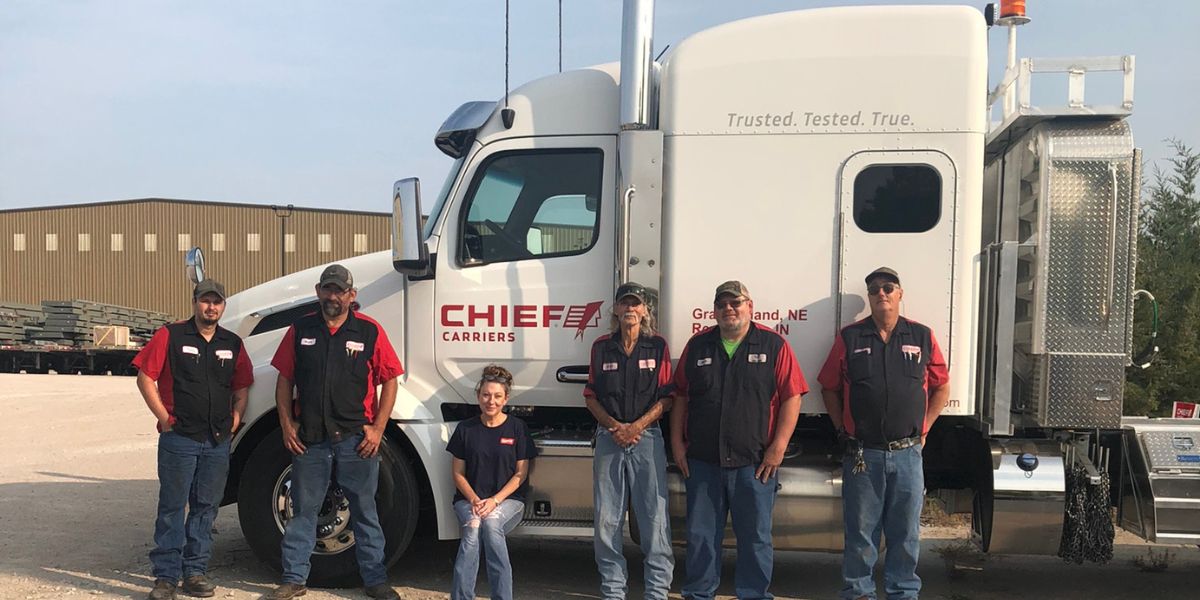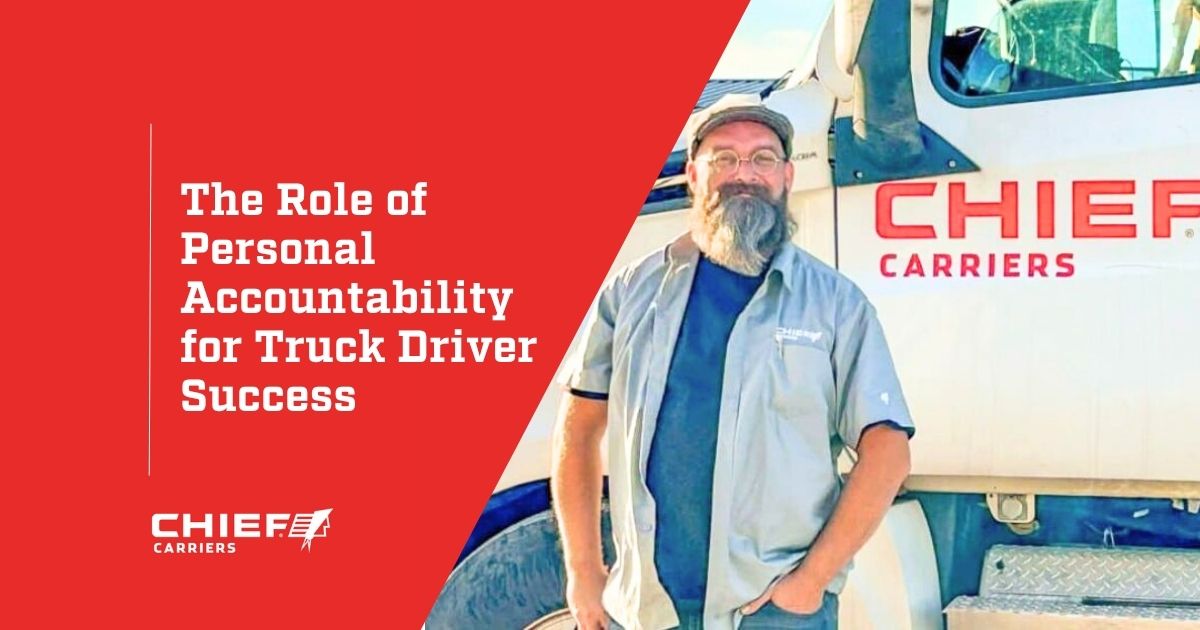Set Yourself Up to Win: How Truck Driver Personal Accountability Impacts Your Paycheck
Successfully making an on-time delivery is a moment of pride that comes from a job well done. But being a successful driver requires more than just getting a load from point A to point B. It’s about taking full ownership of your actions, your vehicle, and your entire career, which is known as truck driver personal accountability.
At Chief Carriers, we know that success in over-the-road trucking is a partnership. We provide the tools and opportunities, but a driver’s commitment to their profession makes all the difference.
We’ll explore how personal accountability for truck drivers directly impacts earnings, quarterly performance review, and overall job satisfaction. Ultimately, being accountable leads to better performance, higher earnings, and a more rewarding and sustainable career.

What is Personal Accountability for Truck Drivers?
In the context of over-the-road trucking, personal accountability means taking responsibility for your choices, your actions, and their outcomes. It’s the difference between a driver who blames traffic for a late delivery and a driver who adjusts their schedule to avoid it in the first place.
This concept isn’t an abstract idea; it’s a series of daily actions that define your professional life. Here are some concrete examples of what it looks like in practice:
- Safety: Taking ownership of safety means consistently performing thorough pre-trip and post-trip inspections, strictly adhering to Hours of Service (HOS) regulations, and maintaining a clean driving record.
- Productivity: To demonstrate accountability and maximize productivity, drivers must be on time for all pickups and deliveries, proactively manage their logbooks, and minimize idle time.
- Communication: An accountable driver is a great communicator who maintains open and honest communication with dispatch about any delays and provides clear updates to customers about their deliveries.
These individual small actions add up to a reputation for reliability, and that reputation directly impacts your opportunities and your paycheck.

Bridging the Gap Between Expectations and Reality
While it’s easy to set high goals, such as earning $1,500-$1,800 a week or driving 2,500-3,000 miles, a significant gap often exists between a driver’s expectations and their actual performance. These goals are ambitious and achievable, but they require a driver to be consistently productive and available. Without personal accountability, a driver’s aspirations for high weekly miles and earnings will remain out of reach.
The real message I want to drive home today is the gap between what your expectations are and the reality of what plays out. If you can’t leave on time, if you can’t secure your load, if you can’t make delivery on time, then those goals just aren’t going to happen.
-Andrew Winkler, General Manager of Chief Carriers
Being consistently late to start your day or to make a delivery costs you more than just time—it costs you potential earnings. Your productivity and availability directly impact the number of miles you can run and the opportunities you’re given. A driver who is always available, safe, and ready to go will consistently be offered more miles.

How Personal Accountability Drives Truck Driver Earnings and Incentives
Accountable behaviors aren’t just about doing the right thing; they’re about maximizing your paycheck. When a company knows it can rely on you, you become a more valuable asset. This translates into tangible financial rewards.
Here’s how personal accountability can directly increase your truck driver earnings:
Fuel Efficiency
The way you drive has a direct impact on fuel consumption. By maintaining a steady speed, avoiding excessive braking, and keeping your vehicle properly maintained, you’re not just saving the company money—you’re often earning fuel efficiency bonuses. This is a common part of many truck driver incentive programs.
Safety Bonuses
A clean safety record is a valuable asset. Maintaining a spotless record, free of accidents, incidents, or violations, often unlocks additional safety bonuses. This is a direct reward for taking ownership of your safety and the safety of those around you.
RELATED: Chief Carriers: Safety Program Success for Nebraska Truckers

Performance Incentives
Many companies, including Chief Carriers, offer a quarterly performance review and incentive programs based on specific criteria. These criteria often include metrics like:
- Safety
- Productivity
- Fuel efficiency
Performance incentives are rewards for outstanding work, not an automatic payout for all drivers. They are designed to acknowledge and reward the drivers who go the extra mile.
I don’t think paying all drivers the same makes sense—some work harder, drive safer, perform better, and are simply more productive than others.
-Andrew Winkler
Reliability
Being known as a reliable and accountable driver makes you a valuable asset to your company. This reputation can lead to being offered better-paying routes, more specialized hauls, and the kind of consistent work that builds a stable career.

Taking Ownership of Your Truck Driver Performance Evaluation
If the driver won’t take personal accountability for why they missed the incentive, chances are they’ll miss it again.
-Andrew Winkler
During a performance review, the best drivers don’t make excuses for areas that need improvement. They conduct an honest self-assessment and ask a crucial question: “What could I have done differently to impact my performance and earnings?”
When you have this conversation with your driver manager and you take personal ownership of the issue, it leads to a more positive and productive outcome. It shows you are committed to improving, and it allows your manager to partner with you on a solution. While a company can set a driver up for success, the driver must be willing to partner with them to achieve it.
RELATED: How Transparent Company Culture Fuels Truck Driver Retention

How to Improve Truck Driver Productivity and Performance
Accountability is a primary focus of any truck driver performance evaluation — even a small mistake early in the week can have a snowball effect, impacting your on-time deliveries and, ultimately, your paycheck. For example, a flat tire on Monday that could have been prevented with a proper pre-trip inspection can throw off your entire week’s schedule.
Many drivers genuinely want to know how to improve their performance. The answer almost always comes back to accountability, a skill you can develop. Here are some actionable steps you can take to enhance your sense of ownership and improve your career:
- Set Personal Goals: To cultivate personal accountability, drivers should set their own goals for safety, efficiency, and professional development rather than relying solely on company targets.
- Leverage Technology: Drivers can use their truck’s technology, such as Electronic Logging Devices (ELDs) and other telematics systems, as powerful tools to self-monitor and improve their performance by tracking their own metrics and looking for areas of inefficiency.
- Ongoing Education: Remaining current with regulations, safety training, and new certifications is a sign of an accountable professional, a proactive step that can lead to more opportunities and better pay.
- Financial Discipline: Truck driver personal accountability extends beyond the road to your personal life, as taking ownership of your finances provides stability and allows you to make clear, focused career decisions without the pressure of financial stress.

Personal Accountability: Your Road to Higher Earnings
Truck driver personal accountability is what drives success in the trucking industry because it bridges the gap between a driver’s expectations and the reality of their paycheck and quarterly performance reviews. By taking ownership of your safety, productivity, and communication, you’re not only setting yourself up for higher truck driver earnings but also for a more rewarding and long-lasting career.
At Chief Carriers, we’re committed to the success of our drivers. We know that drivers who take pride in their work and embody personal accountability are the ones who thrive, and their commitment to excellence should be rewarded.
To learn more about this topic from our General Manager, Andrew Winkler, listen to the Driven Too Far podcast episode, “How Your Choices Affect Your Bottom Line.”

